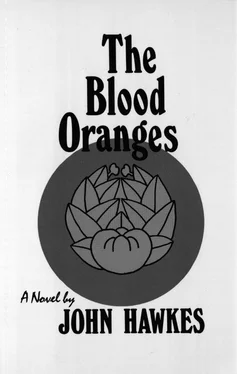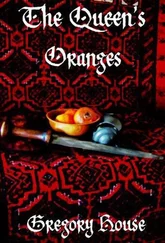YOUTH HAS NO MONOPOLY ON LOVE, THE SAP DOES NOT flow solely in the young. In all my adventures and in all my diligent but unemotional study of sex literature I found nothing to justify the happy expressions of total self-confidence we generally read in the superficially attractive faces of so many younger men and still younger girls. Jaunty, spritely people with trim bodies and unclouded eyes are not necessarily the most capable of those thrust into the center of the pink tapestry. After all, at the height of our season Fiona and Hugh were almost forty, Catherine had passed that mark by several years, while I was already two or three long leaps beyond middle age. Furthermore, we were a quartet of tall and large-boned lovers aged in the wood. Too big for mere caprice, too old to waste time and yet old enough to appreciate immodesty, we were all four of us imposing in height, in weight, in blood pressure, in chest expansion. All except Hugh perhaps, who always said that his long thin legs were the legs of the Christ and whose spare fishy chest was actually day by day collapsing, though like me Hugh was nonetheless capable of carrying either Fiona or Catherine across one naked shoulder without stumbling or shortness of breath. Body to body, arms about each other’s waists, our undergarments and bathing apparel dangling together on a line strung hastily between the two villas, or each standing separately and exhibiting his characteristic gesture — Catherine with her hands at her sides, Hugh clutching his impertinent camera, Fiona unconsciously holding her breasts in hands as bold and sensitive as Leonardo’s, I bare-chested and cigarette in mouth and staring with bland eyes at a full wineglass lifted high in my weathered fingers — at the height of our brief season and in the four fully matured figures of our quartet, anyone with an eye for sex would have recognized an experience, purpose and continuity only hinted at in the poignant stances of young girls with thumbs hooked in bikinis and brown legs stiffly apart. There were four of us then, not merely two, and in our quaternion the vintage sap flowed freely, flowed and bled and boiled as it may never again.
Can youth make such claims?
ONCE AGAIN WE SEPARATED IN THE DARK EMPTY NAVE OF the squat church, Fiona and I, once again went our separate ways, each to the altar of his choice. The windows were cut through those deep walls as if for the arrows, lances, pikes and small cannon of sturdy peasants who might still attempt to defend this church from the barbarians, and without glass, never intended for glass, exposed us, hidden though we were, to the smells and harsh light of the rocky village around us. The windows, mere rude rectangular holes left high in the moist walls, were themselves barbaric, and made me smile. Yet I smiled not only because the windows were unsymmetrical and gave a feeling of ancient violence to altars, cross, shaky wooden seats for solemn populace, as if the dungeonlike church had been abandoned before they had even morticed the last volcanic stone in place, but smiled also at the symmetry of taste and feeling that pulled Fiona and me apart and drew us to altars so nearly opposite in color, mood, design. Hands in pockets, I could hear Fiona breathing quietly and could hear the sharp sounds of her footsteps as she bent all the energy of her tall and beautiful and impatient self toward finding still better angles from which to view the altar.
“Cyril, baby, why don’t you put out the cigarette? For God’s sake.”
And I smiled to hear Fiona’s voice clipped and imploring, harsh and sweet, a mere whisper filled with the richest possible sounds of assurance in the ear-ringing silence of the stone vault. It was like Fiona to talk without turning her head, to respect the sanctity of old stones in a whisper that ruffled the little moth-eaten dress of the infant in Mary’s arms, to comment on my cigarette in her distracted way while squatting all at once to examine a pair of short yellow bones crossed at the base of her favorite altar. Everywhere Fiona was in lovely character, yet nowhere was she more herself than here in the stone crypt where we joked about some day being buried together alive. Her graceful agitation, her girlish fixation on the altar of the dead, the absolute self-possession of a woman so large and yet so faunlike and hard — I could only smile to hear the soft silver of her voice and to see my athletic angel merging her fluted flesh with those cold shadows.
“What’s the matter with my cigarette?” I whispered across the nave in a deep and gentle echo as rich in reverence as Fiona’s. “The little boys have been relieving themselves back there in the darkness. Smell it?”
“Cyril, you’ re making me nervous. OK?”
Then my own slow, bemused, vigorous whisper: “If the little boys can make water, I can smoke.”
How like the two of us to spend each day these long minutes together and yet apart in this little medieval church of cold passion, how like us to choose these different altars. Hands in pockets, brief cigarette still in my mouth, I lounged against my own small altar which was of white marble and was devoted to gold, to fresh flowers, to the wooden Virgin recently lacquered in bright blue paint and stiffly cradling the crude doll dressed in his rotting gown of real lace. The two crowns, the sightless eyes, the feeling of water sprinkled over the whole thing and the sunlight that warmed altar and shoulders alike — here I could lounge suspended in a childish array of cheerful artifacts quite appropriate to my luminous good nature, here laugh aloud and take my time watching Fiona trying to penetrate the secrets of that other altar so absurdly opposite from mine.
“My God, I’ve found the skeleton of a child. Head, ribs, hands, feet — the whole works. How could they do it?”
A moment before she had been sitting on her heels, with the open coat of yellow suede drawn tight across her widened buttocks, but now, never at rest, she was standing on tiptoe directly in front of that black and white altar, while with my usual pleasure I noted her straight legs, her narrow calves stretching with a kind of girlish muscular determination, her hands spread wide and resting firmly on the black marble. Even stock still she was trembling, I thought, even motionless appeared already to be wheeling and running on naked white feet toward her next confrontation with bright light, old stones, new lovers.
“He’s beautiful, poor thing. I’m going to kiss him, Cyril. Shall I?”
Yellow was Fiona’s color, as in the case of the almost tissue-thin suede coat which, in her stretching efforts to reach the skull of the child, was now lifted high above the tight skin behind her knees. And for more than eighteen years she had been most obviously true to character and to her color yellow in the act of kissing, and had spent those years kissing each letter she wrote, each book she enjoyed, kissing flowers, shadows, dead birds, dogs, old ladies, attractive men, as if only by touching the world with her open lips could she make it real and bring herself to life. So even while I was grunting my approval and pleasure, which was the only way to reply to any of Fiona’s questions about kissing, she had already found the small white skull with her eager mouth, and I could only smile still more broadly at the sight of Fiona lavishing one of her brief floods of compassion on the tiny cold features of a grinning relic. It was like Fiona to leave her jasmine scent perfuming the mere skeleton of some unknown infant embedded along with thick-lettered unreadable injunctions against frivolity and sex in their unfrequented altar. To her, no expenditure of her own affection was ever wasted.
But I smelled wax, dust, flaking wood, rusting iron, all the effluvium of devotion and religious craftsmanship. Taking my left hand from my pocket and between thumb and first finger rubbing half-consciously the hem of the tattered dress on the Virgin’s doll, at that moment I found myself looking not at Fiona, who had forgotten me in her brief moment of frenzy in front of the dark altar, but up at a small pulpit lacquered with circus colors of blue and gold and somehow fastened high on the stone wall opposite me. The sun, as on my altar, warmed the pulpit and struck with fire a life-sized wooden arm that protruded over the edge of the pulpit and was extended, as in some kind of benediction, in the wet air. Except for the arm, with its crack near the elbow and its flowing wooden sleeve and pasty yellow hand, and except for the two altars and little peculiar pulpit, I might have been standing in some gutted cellar of the ancient world, some pit giving onto secret viaducts packed with the old world’s excrement.
Читать дальше












